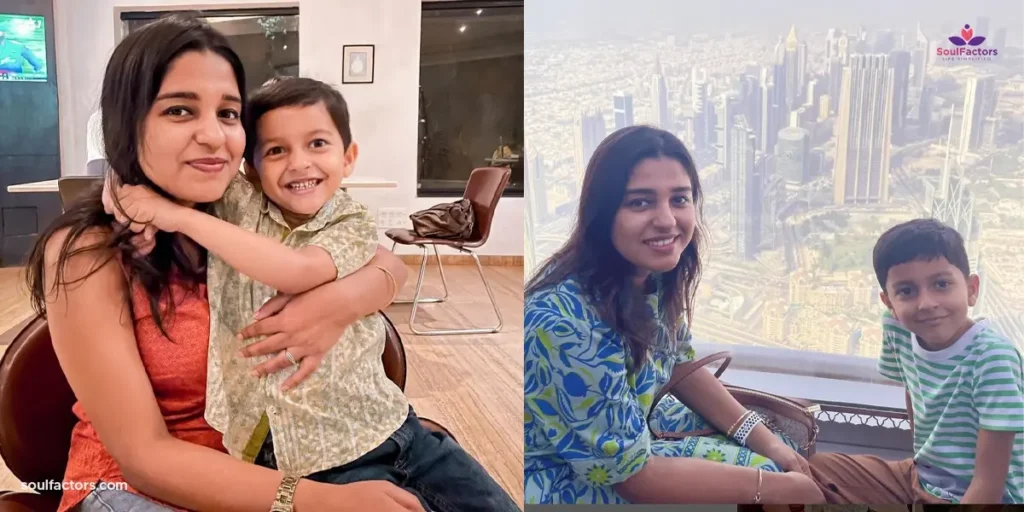Shreya Mitra: Mother to Maternal Mental Health Champion
In an age where motherhood expectations and mental health taboos still reign strong, a young influencer opens up about her struggle through postpartum depression and subsequent emergence as a maternal mental health advocate.
On Dec 14, 2023 – 6 minutes read

In the realm of maternal mental health, Shreya Mitra’s journey unfolds as a tapestry woven with resilience, advocacy, and unwavering hope. From her personal struggles with postpartum depression (PPD) to becoming a beacon for others, Shreya’s story tells how she breaks not only the shackles placed on herself but also embrace a collective call for awareness and change.
The Genesis of Shreya’s Advocacy:
Shreya’s odyssey into the world of maternal mental health began in 2016 when she embarked on the rollercoaster of pregnancy.

Although physically healthy by all standards, her emotional health was deteriorating, due to the cascade of challenges she faced month after month—her grandmother’s passing, her mother’s cancer diagnosis, her husband’s battle with dengue, and her child’s diagnosis of club feet. While her doctor emphasized focusing on her health, a brain hemorrhage during childbirth marked the onset of a mental health struggle that would reshape her life and thousands of others’.
Initially dismissed by doctors due to her young age, Shreya’s postpartum depression journey remained hidden due to societies expectations of blissful motherhood. Even with great support from her family, who took care of the baby all the while she was under treatment. The lack of awareness about maternal mental illness left her feeling isolated.
But from the depths of her struggle, Shreya emerged with a newfound purpose—a commitment to breaking the silence surrounding postpartum mood disorders.
Shreya Mitra’s Evolving Narrative:
Initially, she shared the raw emotions surrounding her postpartum experience-from anxiety attacks to uncontrolled anger, insomnia, and a profound lack of energy. Finally putting an end to the hurdles of misdiagnosis, Shreya’s neurologist recognized her postpartum depression. Armed with therapy and medication, she initiated a blog to demystify the romanticized facade of motherhood. Her intent was clear as day—to coach new moms and educate the masses on the so-called malady of postpartum.
In her interview with SoulFactors, Shreya unveils the broader context of her journey in 2016, navigating personal losses and health crises. Her struggle expanded beyond postpartum depression to childhood traumas resurfacing (1) in peculiar ways, influencing both her behavior and mental health. Gratitude, empathy, and a deeper understanding of mental health became anchors in her recovery.
Expanding on the Mental Health Education Journey:
In response to continued questioning, Shreya expands on her evolution into a mental health educator. Her 2016 journey compelled her to share her story bravely, debunking societal myths around perfect motherhood focusing on her own story, which shocked everybody who knew her as having a perfect life. While her blog initially focused on her postpartum depression, it slowly but surely evolved into a front for educating the masses on mental health struggles. Shreya, now equipped with professional skills, incorporates therapeutic approaches into her workshops.
The interview sheds light on the societal shift in mental health conversations, especially post-COVID. Shreya points out the diminishing taboos surrounding mental health, all the while taboos remaining hindering individuals from seeking professional help. The conversation then pivots to the signs and symptoms of postpartum depression, distinguishing it from baby blues. Shreya’s expertise shines through as she easily lists out various postpartum conditions, emphasizing the importance of seeking professional help for any condition impacting daily functioning for more than two weeks.
Insights into Shreya’s Personal Growth and Parenting Psychology:
The interview uncovers the impact of Shreya’s personal experiences on her parenting psychology. Postpartum depression reshaped her perspective on life. Gratitude, empathy, and a deeper understanding of behavior became integral aspects of her recovery. Shreya shines as she navigates the complexity of mental health conditions, debunking societal expectations around motherhood.
Shreya’s Role as an Influencer and Mental Health Advocate:
As Shreya spoke about her role as a mental health influencer, she reflects on the unforeseen trajectory of her online presence. Initially aimed at clearing the fog of perfection attached to her life, Shreya’s platform evolved into mental health story campaigns.
Her passion for advocacy became evident, and she recognized the potential for this to become a profession. Shreya’s goal is simple and clear—to prevent others from enduring the challenges she faced. Although she doesn’t like the term influencer, as she is doesn’t want to influence anyone any more than educate. She envisions a day when maternal mental health screening in India becomes mandatory and keeps advocating for it.
Insights into Mental Health Education and Seeking Help:
Shreya provides valuable insights into the delay she experienced in seeking medical advice. The interview explores the reluctance individuals face in reaching out to mental health professionals, due by societal judgments and a lack of awareness. Shreya highlights the readiness of mental health professionals and the accessibility of online platforms for support. Her own initiative for creating a database connecting individuals to therapists based on the city.
The Impact of Social Support and Overcoming PPD:

Shreya candidly shares her experiences of bonding challenges during postpartum depression. She acknowledges the difficulty of some mothers face in overcoming this struggle, recounting an instance where a mother was on the verge of hurting herself and the her own child due to extreme condition of PPD. Shreya’s own journey reflects the transformative power of treatment, with the crucial understanding that the first three months are universally challenging. Natural methods like skin-to-skin touch and kangaroo touch, coupled with time away from the baby and fresh air exposure, are emphasized as aids in overcoming this phase.
The Crucial Role of Family Support:
Shreya highlights the significance of recognizing the importance of family support during this challenging time. However, societal expectations and traditional roles can sometimes hinder the necessary support. Shreya’s gratitude for her supportive in-laws is evident, and she stresses the need for mothers to receive support during this delicate period. The interview deepens as Shreya reflects on her family’s support, revealing the difference between their efforts and her unmet needs due to a lack of awareness about postpartum depression.
Shreya gives deeper insights into how families can support someone with postpartum depression. She provides actionable advice—booking an appointment with a psychiatrist, ensuring outdoor time, promoting adequate sleep, and normalizing the situation. The importance of reducing judgment and limiting visitors during this delicate period is a lot higher on the chart than usually deemed. Shreya emphasizes the transformative power of information and the role it plays in shaping effective support.
Shreya’s Vision for the Future:
The interview comes to an end with Shreya’s vision for the future. Her singular goal is to make maternal mental health screening mandatory in India. Shreya envisions collaborations with agencies and production houses to leverage storytelling in ads, social media campaigns, or movies that educate the masses on mental health.
Her workshops serve as a cornerstone, aiming to build a robust support community and a listening circle. Shreya aspires to touch more lives, support families, and provide a non-judgmental space where individuals can access the resources they need.
Conclusion:
Shreya Mitra’s interview unfolds as a profound narrative, binding together personal struggles, advocacy endeavors, and a vision for a positive change in maternal mental health. Her authenticity, resilience, and commitment to awareness created an epic that extends beyond individual experiences. Shreya Mitra emerges not just as a mental health educator but as a catalyst for societal shifts, inviting us all to join her in her grand goal of fostering empathy and championing mental health for mothers across India and beyond.

Subscribe to Newsletter
Elevate your routine, stay on trend, and embrace a personalized beauty journey with our curated insights.





Write a Comment